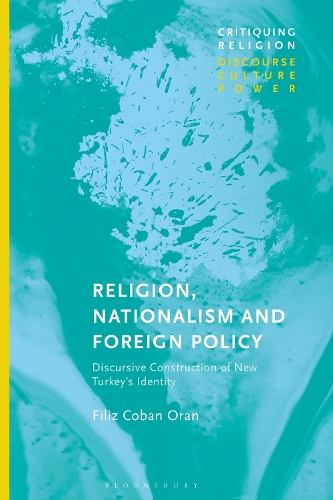
Religion, Nationalism and Foreign Policy: Discursive Construction of New Turkey's Identity
(Paperback)
Publishing Details
Religion, Nationalism and Foreign Policy: Discursive Construction of New Turkey's Identity
By (Author) Filiz Coban Oran
Bloomsbury Publishing PLC
Bloomsbury Academic
27th July 2023
United Kingdom
Classifications
Professional and Scholarly
Non Fiction
Semantics, discourse analysis, stylistics
320.9561
Physical Properties
Paperback
192
Width 156mm, Height 234mm
Description
This book provides a critical discussion on how different discourses of nationalism in the Turkish media construct contested concepts of New Turkeys identity, which has great importance for mapping modern Turkeys place in the world of nations. Drawing on a Discourse-Historical Approach, the author analyses different discourses on Turkish national identity and foreign policy in Turkish media in the second term of the AKP government from 2007 to 2011, which was the period of consolidation of Muslim conservative nationalism in both internal and external relations. By using three case studies, including the Presidential elections in 2007, the launch of Kurdish Initiative in 2009, and the debate of axis shift in Western orientation of Turkish Foreign Policy in 2010, the book argues that not only has AKPs Muslim nationalism reconstructed new Turkish foreign policy, but also new Turkish foreign policy discourse has reconstructed Turkish nations Muslim identity and reinforced Muslim nationalism.
Reviews
In an era of political populism and authoritarianism, few countries provide more interest than Turkey. This authoritative book identifies the periods in recent political history that have shifted the national identity discourse of Turkey in the direction that glorifies a historical past while broadening its appeal to the Sunni Muslim world. * Tahir Abbas, Professor of Radicalisation Studies, Leiden University, The Netherlands *
Author Bio
Filiz Coban Oran is Associate Professor of International Relations at Canakkale Onsekiz Mart University, Turkey. Her research interests focus on nationalism, identity politics and foreign policy analysis in International Relations. She is the editor of Religion and Transformation of International Relations in the 21st Century (2017).
